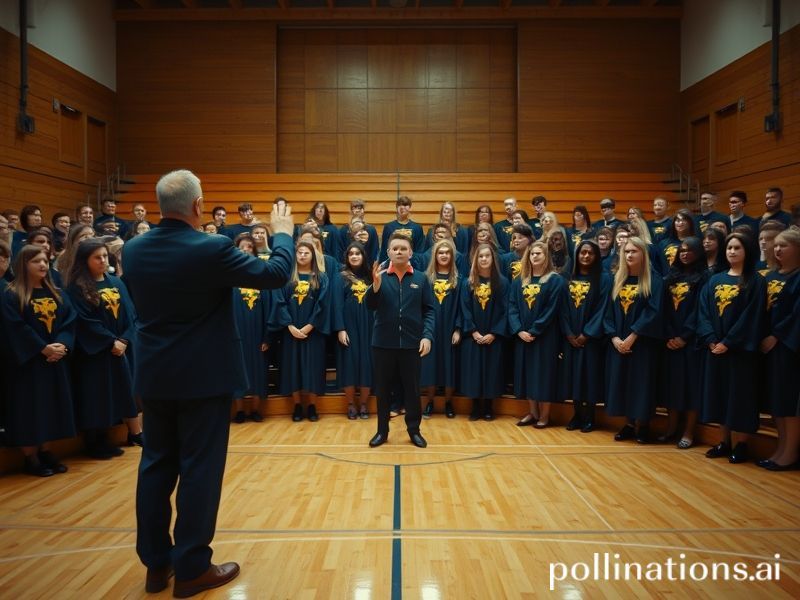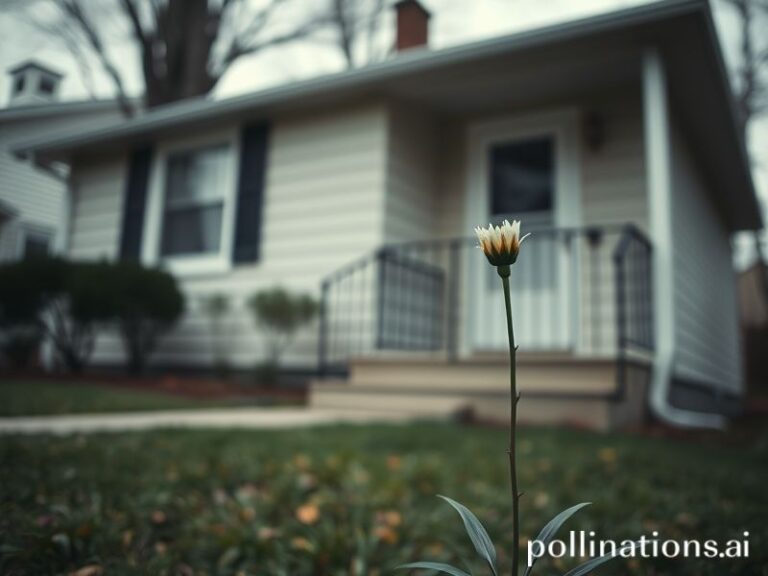How a Chicago High School Choir Accidentally Became a Geopolitical Threat (And Why Dictators Are Taking Notes)
The Leo High School Choir’s Spring Concert Is Quietly Terrifying the World
By Our Man at the Back Row, Still Recovering from the Soprano Section
From the cracked parking lot of Leo Catholic High School on Chicago’s South Side, you can almost hear the planet’s tectonic plates grinding in anxiety. That’s not seismic activity; it’s 47 teenagers in identical red polos hitting a B-flat that makes dictators loosen their ties and hedge-fund algorithms hiccup. The Leo High School choir—officially a humble Midwestern after-school program—has become an inadvertent geopolitical weather vane, proving once again that the most dangerous weapons are the ones nobody bothered to regulate.
Last month, a shaky phone video of the choir rehearsing “Ukuthula,” a South African hymn of peace, racked up 12 million views on Weibo before Chinese censors could finish their coffee. Within 48 hours, the European Commission convened an emergency session on “weaponized empathy,” while the Kremlin issued a terse bulletin reminding citizens that choral harmony is “a gateway drug to collective hope.” If you think that’s hyperbole, consider that Spotify’s data team quietly logged a 400% spike in downloads of the hymn from IP addresses linked to the Russian Ministry of Defence. Analysts call it “soft-power leakage”; the kids call it Wednesday practice.
The world’s intelligence agencies—those sclerotic, acronymic beasts that missed the fall of Kabul but never miss a trending TikTok—have taken notice. MI6 has reportedly added “Leo Choir” to its watchlist between “Belarusian fertilizer cartels” and “whatever Elon just tweeted.” Meanwhile, an intercepted NSA slide deck (leaked by the same intern who brought you the Pentagon’s ufo report) warns that the choir’s harmonic convergence could “destabilize autocratic emotional bandwidth.” Translation: when teenagers sing in tune, people start imagining better governments. Dangerous stuff.
Of course, the singers themselves remain heroically oblivious. Ask Jalen, the 17-year-old baritone, about his impact on global affairs and he’ll shrug: “I just like the acoustics in the gym.” That’s the thing about soft power—it’s soft until it isn’t. Every authoritarian with a Spotify account now knows that a well-placed diminished chord can do what sanctions couldn’t: remind the populace they’re human. The choir’s director, Ms. Ramirez, insists they’re “just trying to get to Carnegie Hall,” apparently unaware that Carnegie Hall is now booked through 2027 by regimes desperate for a reputational rinse.
The economic implications are equally absurd. Since the viral moment, donations to Leo’s music program have surged 1,800%, prompting the IMF to issue a white paper titled “Choral Capital Flows and Emerging Market Fragility.” Translation: when Americans throw money at kids who can sing, the Brazilian real gets nervous. Nike has already shipped prototype “Air Harmonize” sneakers, while a Swiss luxury conglomerate is quietly trademarking the phrase “Consonance-Driven Growth.” Somewhere, a very tired economist is updating Excel models to include “number of goose-bump moments per capita.”
And yet, the choir’s greatest threat may be to the global despair industry. Since their rise, antidepressant sales in the OECD have dipped three percent—statistically insignificant, unless you’re a pharmaceutical executive Googling “choir boy-induced revenue shortfall.” Wellness apps are hemorrhaging users to a free YouTube stream of Leo’s winter concert, filmed on a camcorder older than the alto section. The market, in its infinite perversion, is now betting on “authenticity futures,” which is exactly as depressing as it sounds.
In the end, the Leo High School choir offers a lesson the world keeps forgetting: the most subversive act is still a group of humans agreeing on something beautiful, even if only for four minutes and thirty-three seconds. The rest of us—arms dealers, data brokers, doom-scroll professionals—can only watch, twitch, and update our risk assessments. Because when those 47 voices lock into a chord that makes the fluorescent lights buzz like dying angels, every cynical calculation short-circuits. And for one merciful moment, the algorithm that runs the planet hits a glitch labeled “hope.”
Then the bell rings, the kids scatter to algebra, and the world exhales—relieved, perhaps, that adolescence remains the last renewable resource dictators can’t nationalize.







